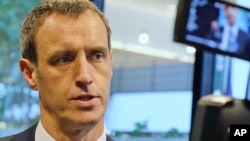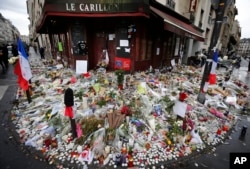Europe’s latest effort to counter the growing threat from foreign fighters is being hailed as a hopeful first step but there are deep concerns that the new measures will not prevent another Paris-style attack.
Officials late last month launched the European Counter Terrorism Center, described by the European Union’s law enforcement agency, Europol, as “a unique European information hub.”
The focus, Europol Director Rob Wainwright has said, is “improving the level and effectiveness of information exchange between the national authorities in the European Union.”
The timing of the center’s launch is critical as reasons to fear another attack increase. Europol estimates between 3,000 and 5,000 foreign fighters have returned to Europe from Iraq and Syria.
“We have the problem of foreign fighters coming back to Europe either from Syria or Libya,” a Western diplomat told VOA, adding that despite increased security measures, “It’s very easy.”
The head of Germany’s domestic intelligence agency, Hans-Georg Massen, told ZDF television earlier this month that terrorists disguised as refugees have slipped into the country repeatedly. Massen’s comment came a day after German forces arrested two men with possible links to the Islamic State terror group for plotting an attack on Berlin.
EU officials are hopeful the new counterterror center will soon leverage arrests like those into additional successes.
“The ECTC is building on already some existing capabilities within Europol,” spokesperson Tine Hollevoet. “By adding new capabilities and putting all of this together in a new center, we believe that this will significantly increase our response to terrorists.”
Will member states share information?
For now, the center is employing a staff of about 45 counterterror experts.
“The key is on the information sharing by the member states,” Hollevoet added.
Still, some doubt the new counterterror center has the wherewithal to make it happen.
“The creation of the center has not come attached with any new major powers for Europol,” said Javier Argomaniz, with the Handa Center for the Study of Terrorism and Political Violence at St. Andrews University.
“The key obstacle remains security agencies' organizational culture and their traditional reluctance to exchange valuable operational data, especially if this could result in leaks,” he added.
Former CIA counterterrorism analyst Aki Peritz is equally skeptical.
“There are 28 member states of the EU,” he said. “The big boys are not going to share with everybody.”
And that is just one of the many obstacles the new EU Counter Terrorism Center will face, according to Peritz, now vice president of the Center for Intelligence Policy.
“What you really need to do here is collect on individuals going to and from Syria and Iraq and elsewhere, and you’re going to run into a lot of civil liberties laws and problems because each member state has different laws when it comes to that,” he said. “I’m not quite sure how they’re going to overcome that issue.”
Peritz also questions whether the Paris terror attacks, which killed 130 people, will galvanize the EU in much the same way the September 11, 2001 attacks galvanized the United State, spurring change across the law enforcement and intelligence communities.
Others are more hopeful
“The extent to which it will be up and running as really an effective entity is a question, but I think it’s a great step,” said William Braniff, executive director at the University of Maryland's National Consortium for the Study of Terrorism and Response to Terrorism.
Specifically, Braniff thinks the new center may be able to seize on some “low-hanging fruit” when it comes to information sharing, especially when it comes to foreign fighters.
“There’s been a lot of finger-pointing in Europe between the countries of origin of the foreign fighters,” he said. “What I’m hoping is that this will create a parallel environment where practitioners can actually address these in a much more productive way, maybe outside of that political microscope.”
Another potential reason for optimism is that European officials have been talking to U.S. law enforcement and intelligence agencies, including the Department of Homeland Security and the FBI, which have already grappled with similar issues.
“We’re trying to benefit from each other’s experiences,” said Kshemendra Paul, Program Manager of the Information-Sharing Environment at the U.S. Office of the Director of National Intelligence.
“We’ve been in conversation over the last year-and-a-half, two years to line up the frameworks, to make sure where we have pursuit of the same ideas,” he said. “We’re not putting in gratuitous or unnecessary barriers to interoperability.”
May not head off next attack
Officials and analysts hope the new European Counter Terror Center will prove valuable both in the short and long term, though they admit it alone will likely not be enough to deter Europe’s next major terror attack.
“It’s part of a menu of things that need to be done both at the government level and cross governments to deal with the extremism threat,” said Mark Wallace, CEO of the U.S.-based Counter Extremism Project.
“I wouldn’t call it a panacea but, certainly, a positive step,” he said.






